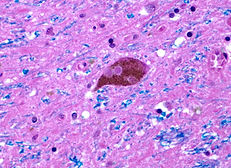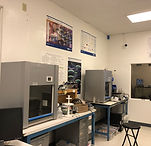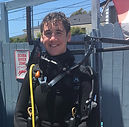Biological & Life Sciences
Department of
Research Areas
Research in the Biology department spans a variety of disciplines in the life sciences as we seek to discover more about the living world around us. Researchers in the Biosciences are currently working on a range of research campaigns from developing therapies for neurodegenerative disease to identifying factors for optimizing crop yields in urban agriculture, and from isolating and sequencing environmental DNA from soil samples to probing mechanisms of cell signaling in cancer cell proliferation.
Cancer Biology & Oncology
Investigators: Zhang, Cunha
Cancer is a disease that affects people from all populations and from many different backgrounds. The current pipeline of cancer research at ASDRP seeks to:
-
develop new therapeutic options for leukemia, colorectal cancer, and breast cancer
-
identify mechanisms of activation, proliferation, metastasis, and immortalization of cancer cells
-
engineer new antibody therapeutics to selectively target cancer tissues


Microbiology
Investigators: Cunha
Studying the universe's smallest organisms can provide clues about the roles that microbes play in local ecology as well as in human disease.
Our microbiologists are working on:
-
developing antifungal compounds to combat mycotoxin-producing fungi and foodborne illness
-
using environmental DNA (eDNA) sequencing techniques to determine species dispersion
-
identifying molecular mechanisms of microbe-host communications
-
developing next-generation antibiotics to treat bacterial and parasite infections


Environmental Science & Ecology
Investigators: Suresh
Environmental and ecological research at ASDRP seeks to bring to light the complexity of the planet we live in. Our researchers in environmental science are working on:
-
determining impacts of human activity on local ecology and on climate change
-
combating destructive forest fires through mitigation strategies
-
using environmental DNA (eDNA) to search for species dispersion
-
identifying gene flow in wildlife populations and gauge susceptibility to climate change
-
optimizing crop yields in urban agriculture to feed underprivileged communities in collaboration with local community gardens
Molecular Neuroscience
Investigators: Jahanikia
Developing new knowledge on how molecular mechanisms affect organism behavior is critical to identifying ways of treating numerous human diseases.
-
using genetically engineered model organisms to investigate the progression and prevention of neurodegenerative diseases such as Alzheimer's and Parkinson's disease
-
investigating drug dependence and treatments for Schizophrenia and other psychiatric disorders


Department Lead: Dr. John Wang

Contact:
John Wang, PhD
Education:
Postdoc: Stanford University
PhD, Biochemistry & Molecular Biology, Indiana University
Area of Research: Antibody engineering, Molecular Biology
Dr. Wang received his PhD in Biochemistry and Molecular Biology from the University of Indiana School of Medicine (Dissertation: “The regulation of glycogen metabolism in the yeast Saccharomyces cerevisiae: Role and regulation of autophagy.”) Following this, Dr. Wang joined Stanford University, where he worked as a post-doctoral research fellow in the Department of Oncology, Stanford School of Medicine, and eventually as an Instructor in the same department. Subsequently, Dr. Wang joined the team at Amgen, where he served as a lead scientist on several antibody projects. Following this, Dr. Wang served as the Director of Biological Applications at Curiox Biological Systems Inc. and then as the Chief Scientific Officer for BJ Biosciences Inc. where he was responsible for developing engineered proteins for targeted cancer therapy, the latest of which is currently in an FDA Phase I clinical trial. Dr. Wang joined the faculty at ASDRP (where his son is also a student researcher), where he has established a research group working on quantitative molecular biology projects bridging the worlds of precision diagnostics, protein engineering, antibody development, biologics-based cancer therapies, and molecular medicine. Throughout his training and industrial career, Dr. Wang has been an author on multiple high impact publications including in journals such as Nature and Cancer Cell.
Faculty & Principal Investigators
Clinton Cunha
Bioinformatics
Clinton has a Masters in Bioinformatics (University of Guelph) and a Masters of Science in Cellular and Molecular Medicine (University of Ottawa). He also has an Honors Bachelor's degree in Biological Sciences (Carnegie Mellon University). His main areas of focus include Bioinformatics, Data Analysis, Python programming, Biology, Science, Cancer Research and ESL. Professionally, Clinton is a qualified Bioinformatician, Biologist, Instructor and knows how to deal with different types of biological data to derive meaningful relationships using Python, SAS, R and Unix.
Sahar Jahanikia
Computational Cognitive Neuroscience, AI & Data science
Experienced computational cognitive neuroscientist proficient in Computational Neuroscience, Neuroimaging, Behavioral Sciences, Neuroinformatics, Artificial Intelligence (AI), Data Science, Machine Learning (ML), Design Thinking, and Bioinformatics. Brining extensive experience in designing, gathering, and analyzing cutting-edge neuroimaging data studies using various modalities such as fMRI, NIRS, EEG, and simultaneous EEG-fMRI. Additionally, she is expertised in incorporating Large Language Models (LLMs) into cognitive science research.
Shubhi Jain, MD/MPH
Public Health, Epidemiology
Dr. Shubhi Jain received her MD from the University of Baroda in India, and studied Applied Epidemiology in the MPH program at the University of North Carolina, Chapel Hill, and combines a unique blend of clinical expertise & public health analytics. 5+ years of clinical experience in diverse healthcare settings (USA & India). Dr. Jain will be leading a group in public health research, infectious disease, health communication, or program implementation to leverage a deep understanding of research protocols, clinical data integrity, and evidence-based decision-making in the biotech/pharma industry.
Madhulika Jupelli, PhD
Immunology & Molecular Biology
Dr. Madhulika Jupelli received her PhD in cellular immunology from the University of Texas, San Antonio, and did her post-doctoral training at Cedars Sinai Medical Center and at the Los Angeles Children’s Hospital in infectious diseases. Following this, Dr. Jupelli’s industry career led her to several medium- and large- biopharmaceutical companies, including her work at Bristol Myers Squibb, and more recently at Pfizer. Dr. Jupelli has to her name three FDA clinical trials, including a Phase III clinical trial for GBT021601 (Osivelotor) for the treatment of Sickle cell disease.
Bharat Poudyal, PhD
Biotechnology & Agricultural Science
Dr. Poudyal is a resident of San Leandro, CA. He started his high school education in Agriculture from India, B.Sc Agriculture from Nepal, M.Sc in Seed Technology from Scotland and finally he received a Pd.D from China in Agronomy research on Plant Tissue Culture/Biotechnology. He is interested to do mentoring on plant tissue culture, work on urban farming as well as vegetables and their role on health. "Working from LAB (to generating technology and making discoveries), to LAND (to implement said technology and knowledge), and eventually to LAP (to enjoy and benefit all creatures through innovation)"
Vasudha Salgotra
Biology and Chemistry
Vasudha Salgotra is a research professional with a background in analytical chemistry and pharmacy. She has years of experience in supporting preclinical activities in drug development and delivery for small and large biologics. Her professional journey includes designing and validating plate-based immunoassays (ELISAs) and other bioanalytical techniques.
Chandan Shee, PhD
Molecular Biology, Genetics
Dr. Chandan Shee is an accomplished biologist and leader with a solid history of achievement in the areas of molecular biology, NGS technology, and IVD product development. Dr. Shee received his PhD in Molecular & Cellular Biology from the Indian Institute of of Technology, Roorkee, and received his postdoctoral training at Baylor College of Medicine, where he went on to be an assistant professor. Following his academic career, Dr. Shee held senior positions at Theranos, Ultima Genomics, and Guardant Health, and has published over two dozen papers in diagnostics and microbiology.
Soumya Suresh, MNR
Environmental Science, Conservation & Ecology
Soumya’s expertise as an environmental scientist ranges from using environmental DNA (eDNA) and genomics for understanding ecological systems and the impact of human activities and forest fires on Northern California forest ecology. Ms. Suresh's Environmental Science groups deal with conservation issues with plants and wildlife. Our groups employs various scientific collection and analysis methods such as molecular biology, field data collection, lab specimen growth and care, and permit application. Soumya received her Master's in Natural Resources from Oregon State University.
John Wang, PhD
Molecular and Cell Biology
Dr. John Wang received his PhD in Molecular and Cell Biology from Indiana University, and following that was a postdoctoral reserach fellow at Stanford Medical School in Oncology. Following this, Dr. Wang has been a leader in modern cancer immunotherapy, and has served as the chief scientific officer of a leading biotech company. Dr. Wang and his colleagues have previously placed multiple candidates, including most recently an interleukin-15 construct, into human clinical trials with the FDA.
Tracy Zhang, PhD
Cancer Biology & Oncology
Dr. Zhang holds a PhD in Biomedical Sciences from Hong Kong and has also completed two post-doctoral fellowships, one at MD Anderson Medical School (University of Texas) and the University of Connecticut. She has coauthored over twenty peer-reviewed publications in cancer biology and oncology, and is a 10+ year expert in molecular oncology.
Facilities & Instrumentation

Biological Laminar Flow Hoods/Cell Culture Hoods
Our biology research laboratory has four laminar flow hoods, which keep a sterile environment for work with sensitive cell culture or with genetic manipulation.

Pelton & Crane Sterilizing Autoclave
ASDRP has an industrial-grade autoclave used for sterilizing solutions and biological media using ultrahigh pressure (upwards of 300 degrees!) and pressure (over 3,000 torr!)

Jouan IG650 CO2 Incubator
Whether our biologists are growing cells in petri dishes, or keeping a uniform termperature and humidity, this industrial-grade incubator can accomodate it all.

Microscopes
ASDRP has a wide array of professional grade microscopes and microscopy supplies, from cell fixation to a confocal microscope for fluorescent imaging.

Centrifuges & Microcentrifuges
Our biology research laboratory is equipped with eight centrifuges of varying size, power, and speed; centrifuges separate mixtures such as cell lysate on the basis of density.

Hoefer Scientific DNA Fluorometer
Our DNA fluorometer captures fluorescence of nucleic acids and can be used to quantify nucleic acid concentrations in the micromolar range.
.jpg)
LabLine 5 x Liter Incubated Shaker
One of two incubated shakers in operation in our laboratory, this is used to grow cell culture and to express proteins in up to 5 liters at a time. Shake away!

LC Packings High Performance Liquid Chromatography (HPLC)
Our HPLC is capable of even the most challenging molecular separations, and is fully equipped with a reverse phase C18 column and a built-in UV detector.

BioRad SmartSpec 3000 UV-visible spectrophotometer
One of our six research-grade UV-vis spectrophotometers, this instrument is capable of absorbance spectra readings, time-resolved absorbance kinetics, and quantification of nucleic acids.

BioRad Criterion/Protean SDS-PAGE Station
Our biochemists are often interested in purifying and separating proteins based on molecular weight. SDS-PAGE is a technique for characterizing proteins.

DNA Gel Electrophoresis Station
Gel electrophoresis is used to characterize and separate nucleic acids (and other materials) on the basis of charge, molecular weight, or both.

MilliPore MilliQ Water Purification System
Sometimes, even de-ionized water isn't good enough! Our MilliPore tower generates nuclease-free "Milli-Q" ultrapure water for the most sensitive biological assays.

Bio-Tek MicroQuant 96-Well Plate Reade
One of three microplate readers, our BioTek instrument is capable of high-throughput fluoresence/absorbance screening in biochemical assays of up to 96 samples at once.

MJ Scientific Programmable PCR Thermal Cycler
Polymerase chain reaction (PCR) is a commonly used technique to amplify particular sequences of DNA. This is one of two thermal cyclers that ASDRP owns.

Bioreagent Stockroom
Our biology laboratory is fully equipped with almost any molecular biology kit imaginable from Qiagen, Zymo, Thermo, Millipore, and Sigma Aldrich.
Former Advisors
Connor Adams
Ocean Science
Connor is a graduate of U.C. Santa Cruz with an M.S. in ocean science and a B.S. in environmental science. His research experience includes fisheries management of Belize’s spiny lobster (Panulirus argus), and aggression/fecundity in mangrove rivulus fish (Kryptolebias marmoratus).
Andrew Benson
Marine Biology
Andrew is a marine biologist and graduate of San Diego State University and an avid diver and tide pooler. While there, he studied the effects of ocean acidification and warming on Zostera marina and on the seagrass epifauna. Researchers in the Benson group worked on a variety of marine biology research areas.
Prabhjeet Kaur
Microbiology, Genetics
Prof. Prabhjeet Kaur graduated from CSU Bakersfield with an MS in Microbiology and a BS in Biology with an emphasis in Microbiology. She has been a full-time Microbiology Instructor at COS Visalia. I have been teaching college level biology courses for the last 5 years, and Prof. Kaur is currently an adjunct Anatomy Professor at EVC San Jose. Her thesis research included work on Coccidioides immitis, the causative agent of valley fever in the Northwestern Mojave Desert, and the Kaur lab is interested in a variety of ecological-microbiological scientific questions.

Martin Kushnerov
Genomics and Bioinformatics
Martin received his MSc in Medical Genetics and Genomics at University of Glasgow in Scotland and his BSc in Human Biology at UC San Diego. His research interests focus on studying genetic and epigenetic regulation of biological mechanisms and interactions to better understand their effects on genomic expression and modifications. He has previously studied viral genetics and mutational analysis of viral genomes and proteins.

Gayathri Renganathan
Medicinal Biochemistry
She received her M.Pharm in Pharmaceutical Analysis from Anna University and experience as a lecturer and in quality control and in inorganic/analytical biochemistry. She applies small molecule phytochemistry in a robust drug discovery platform towards understanding the molecular mechanisms of human disease. She uses a variety of biophysical computational tools to understand the interaction of small molecules with their protein targets. Works on the interface of chemistry and biology, using both experimental and computational techniques to find phytochemicals with clinical potential.

Michael Amadi
Synthetic Biology & Biotechnology
Sormer UCSF scientist and founder of Jikoro Sciences, Michael is a scientist who is interested in the interface of biotechnology and synthetic biology. The Amadi lab at ASDRP works on projects related to genomics, metabolomics, and biotechnology/bioengineering. Michael, a serial entrepreneur, is interested in the interface of biomaterials, tech, and synthetic biology.
Ankur Gupta
Molecular & Cell Biology
Ankur Gupta served as the Director of the Biomedical Science Research Cluster, and used his expertise in molecular and cell biology to better understand the signal transduction pathways that are critical in development of and progression of cancer, including oncogene expression patterns.

Avery Kruger
Ecology, Evolution, Biodiversity
Avery M. Kruger’s lab performed research in the area of environmental biology, ecology, biodiversity, and evolution - using the tools of molecular biology and biotechnology to better understand the ecology of the Bay Area. Further, his research works on issues of environmental remediation and pollution, including attenuating chemical waste and the human environmental footprint.

Nardeen Mikhail
Microbiology
Nardeen received her M.S. in microbiology and has several years of teaching and research experience. Her research interests involve understanding the biology, physiology, and life cycle of diverse mycotoxin-producing fungi strains, which are associated with food spoilage. The Mikhail research group is affiliated with the Biomedical Research cluster and performs research in fungal microbiology.



.png)










_edited.jpg)

